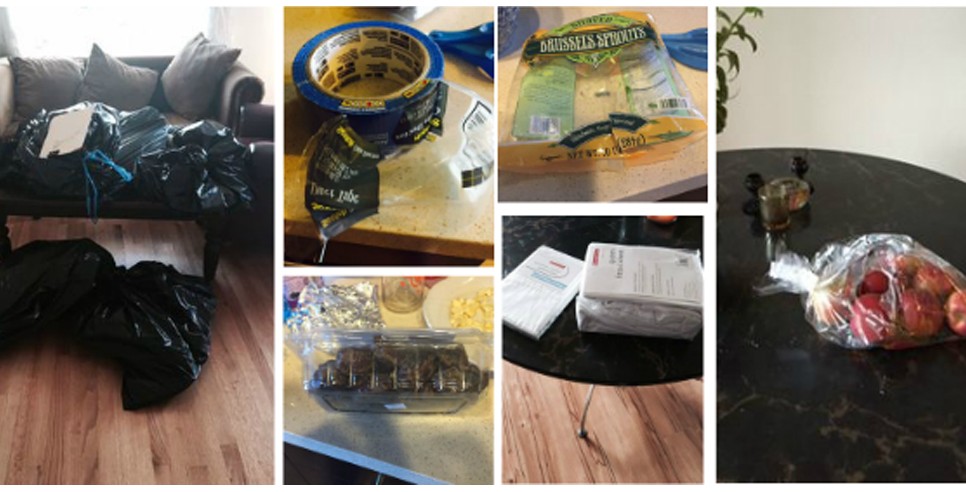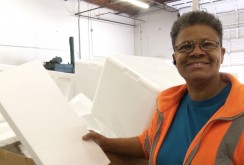
The city of Seattle's ban on plastic bags has been in effect since July 1, 2012, and yet if you walk down any grocery aisle you will encounter the seven basic types of plastic. Every sandwich, vegetable (frozen or fresh), sack of fruit, snack, beverage (pop, water, juice), is shrink-wrapped or encased in plastic.
If plastic shopping bags are illegal, then why are we entombed in plastic? Everywhere we shop, plastic is in abundance. From the minute we get up in the morning until end of day, most of what we touch in the way of consumables is wrapped in plastic.
There is bad plastic, very bad plastic and not-so-bad plastic, so how do you tell the difference? There are several reputable guides found online. One is published by the Institute for Agriculture and Trade Policy. Called the Smart Plastics Guide, you can take a technical walk through healthier ways to use plastic.
The source for the fountain of all plastic is big oil. The one thing that all plastic shares in common is that it is petroleum-based product. And all plastics contain a certain amount of toxicity, even if at the lower levels it is judged to be safe. A good rule to follow would be to minimize the use of plastic, especially when you are eating or storing food, or drinking beverages. Public safety guides emphasize the importance of using paper, wood, metal or glass instead of plastic storage containers, plastic bottles and plastic cups.
Environmentalists and like-minded citizen activists have long recognized the inherent health and safety risks posed to people and to animals in the day-to-day consumption of plastic. These groups have successfully spearheaded legislation to ban retailers from using plastic bags. Seattle’s plastic bag ban is on par with similar bans in other progressive areas: San Francisco, CA, Banned plastic bags in 2007; Los Angeles County, Banned Plastic bags November 2010 and included a 10 cent fee on paper bags; Portland, OR, Banned plastic bags in summer 2011.
Seattle’s plastic bag ban law addresses what is generally perceived to be a liberal cause in favor of environmentalists and public safety. In reality, the plastic ban law has no impact on the overwhelming abundance of plastic stocking the shelves of grocery stores, health and beauty aids, hardware stores, and many other retailers and medical device companies. The plastic bag ban law penalizes shoppers who don’t bring their own bags to the checkout line. By law, retailers are not allowed to give away free shopping bags and must charge five cents a bag. In the early days when the law first went into effect, retailers could only sell shopping bags made from 40% recycled paper. According to the law, small, greeting-size paper bags are permitted to be given away for free. Now that the law has relaxed, and shoppers are comfortable paying the five-cent surcharge, many retailers sell plastic sacks too. The five-cent plastic sacks do bear the retailers’ name and logo, and it is all perfectly legal.
Charging shoppers five cents a bag has provided large retailers a new revenue stream. Granted, a nickel is not much, but for retailers doing thousands of transactions a day, nickels add up to a tidy source of revenue. While the law does require retailers to classify bag sales as taxable income, it does not require retailers to track and audit how many bags are being sold to shoppers.
The message here is more than good plastic or not-so-good plastic. The story on a plastic bag ban that penalizes shoppers is a lesson about spin so cleverly created that it can barely be discerned. Local governments, including the Seattle city council, appear to be making good law by placing a monetary penalty on shoppers for forgetting to bring their own shopping sacks to the checkout. Politicians assert that they’ve created a financial incentive to encourage shoppers to forget about plastic and to bring reusable bags to the checkout counter. There do not, however, appear to be financial incentives to encourage corporations to use paper, wood, metal or glass to package food and beverages.
In reality, the price of banning plastic bags has become a new source of revenue for corporate interests and mega retailers like Safeway, Bartell Drugs, Rite Aid and Trader Joe’s, just to name a few. Popping a loophole in the plastic bag ban poses a piercing question: why aren’t wholesalers, manufacturers and retailers penalized for producing so much plastic?
For consumers to have to pay five cents a bag is just too HEFTY® a price to pay.









